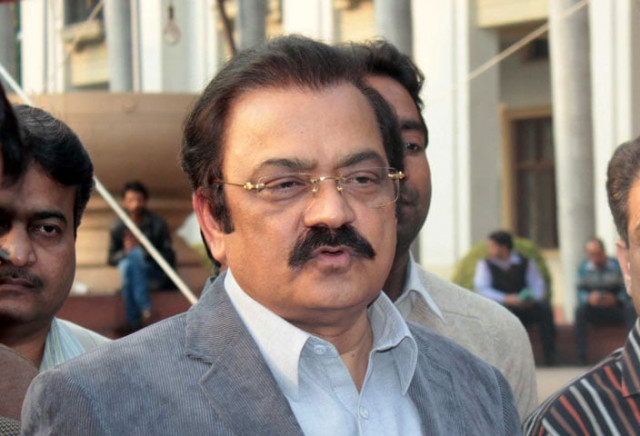Govt to target online 'blackmailers'
Interior minister announces action against 'immoral videos' on social media

Interior Minister Rana Sanaullah on Friday said the government would target “immoral videos” on social media, launching a crackdown on people spreading them with an intention to defame individuals and character assassination.
In a statement, the minister said the decision was made to prevent people from blackmailing others.
“Those who spread immoral content on social media will be arrested,” he warned.
“The prime minister has directed not to tolerate such material. We will not allow social media to be used to humiliate people.”
Rana said the elements involved in such criminal activities would be dealt with sternly.
“Instructions have been issued to [the Federal Investigation Agency] FIA and related agencies for this purpose,” Rana elaborated, adding that the government would “wipe out those who spread this kind of filth”.
The interior ministry announced the crackdown hours after the FIA said it had taken notice of "fake videos" spreading on social media, announcing that an investigation had been initiated as well.
"An investigation has been launched. Strict legal action, in the shape of imprisonment and fines, will be taken against the persons involved in making and spreading these videos. People are advised to stop sharing such content," the agency said in a tweet.
According to sources, the FIA has also decided to contact the Pakistan Telecommunication Authority (PTA) to take action against the accounts spreading fake videos on social media.
According to the FIA, there are severe penalties for propaganda and defamation under the new social media laws.
In the first phase, the FIA cybercrime wing has been tasked with identifying such social media IDs, after which the necessary action would be taken, including arrests.
| Read: PTI social media drive pressuring judges |
Just two days ago, PTI chairman and former premier Imran Khan had accused his political opponents of engaging in “fifth-generation warfare” against him during an exclusive interview with actor Shaan Shahid on a private news channel.
During his interview on Wednesday, Imran had claimed that the ruling coalition of the PML-N and PPP hired companies to produce "fake videos" to tarnish his reputation.
Ironically last month, PTI leader Ali Muhammad Khan had shared a photo taken in 2014 by NASA from the International Space Station (ISS), claiming it to be from his party’s public gathering in Peshawar.
The photo was taken by NASA to highlight air pollution, which the PTI leader used as one of the photos in a tweet he posted after his party’s power show in the provincial capital of Khyber-Pakhtunkhwa.
Deepfakes are synthetic media in which a person in an existing image or video is replaced with someone else's likeness. While the act of faking content is not new, deepfakes leverage powerful techniques from machine learning and artificial intelligence to manipulate or generate visual and audio content with a high potential to deceive.
The main machine learning methods used to create deepfakes are based on deep learning and involve training generative neural network architectures, such as autoencoders or generative adversarial networks.
Deepfakes have garnered widespread attention for their uses in creating child sexual abuse material, celebrity pornographic videos, revenge porn, fake news, hoaxes, bullying, and financial fraud.
This has elicited responses from both industry and government to detect and limit their use.












1724319076-0/Untitled-design-(5)1724319076-0-208x130.webp)






COMMENTS
Comments are moderated and generally will be posted if they are on-topic and not abusive.
For more information, please see our Comments FAQ